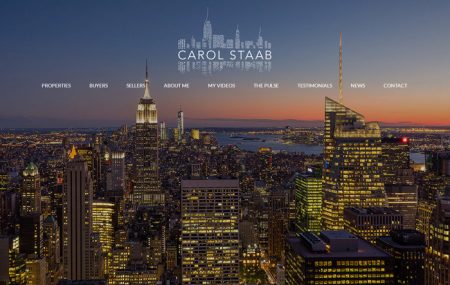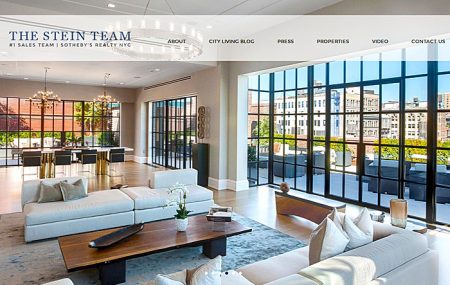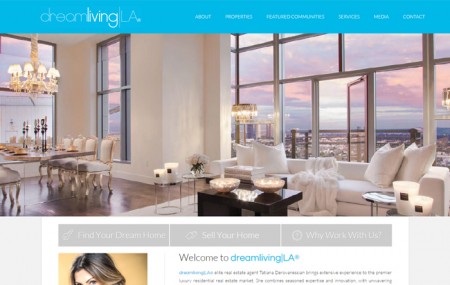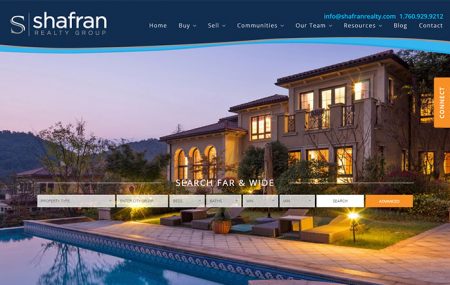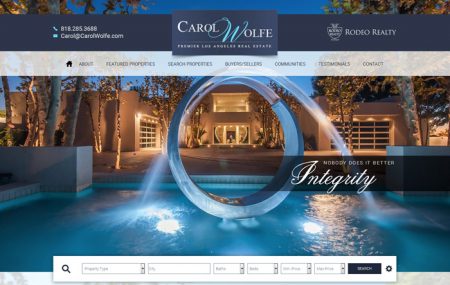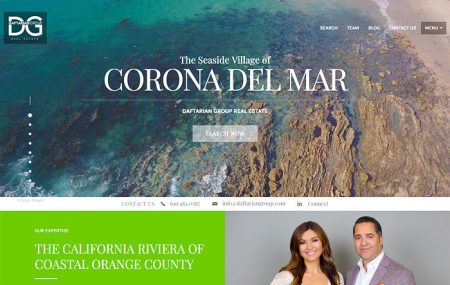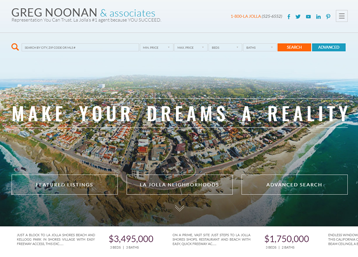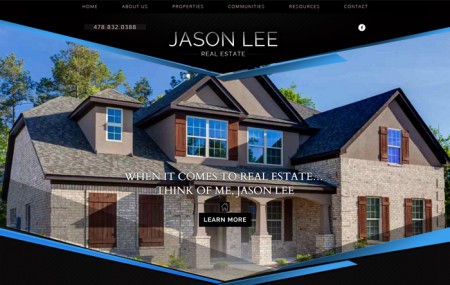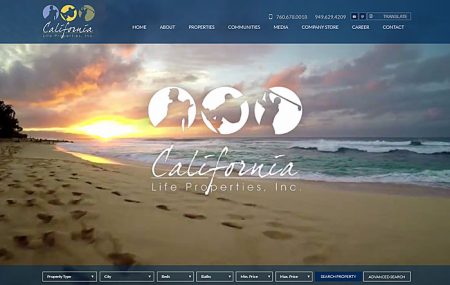
One of the questions I get asked most often when I’m speaking to students is, “what kind of digital marketing should I be doing to promote my real estate business?”
It’s a great question. I personally love online advertising — especially social media, and if you’ve seen either my Instagram or Facebook accounts you would know!
But there’s a lot more to having an effective real estate digital marketing strategy than just tweeting, posting, and liking.
When Tarek and I started out our real business, we didn’t have much of a clue about real estate digital marketing. It was basically a system of trial and error. Today, that’s no longer the case. We know what works online and we’re happy to share some of our strategies.
-
Make sure that you have a modern-looking website that makes a great first impression.
Most home buyers and sellers these days start the initial real estate process online. You should be able to put your best foot forward by having a real estate website that’s truly representative of you and your brand.
It needs to have appealing graphics, be easy to navigate, and should instantly make visitors feel welcome from the first second they click on it.

Talk to a web designer and see if they can add the following design elements to your real estate website:
-
Beautiful, high-definition photos of the housing market you specialize in
This is the best advertising for realtors. It helps grab people’s attention in all the right ways! Whether the pictures you use are small or fullscreen (or a mix of both), imagery helps break up sections of text and, most importantly, it showcases everything your area has to offer.
-
Custom Property Display
If you have high-profile listings in your portfolio, the best way to show them off is through a custom property display. This way, all the listings get the maximum exposure they need. Plus, you’re letting people know you are trusted by high-profile clients. It’s an instant boost to your brand and your reputation, making it an ideal addition to your real estate digital marketing strategy!
-
Value Proposition
You don’t just want your real estate website to be beautiful and user-friendly. You want it to be able to generate and capture leads as well. So, why not offer something that prospective clients won’t be able to resist? You can give free real estate consultations or access to exclusive home buying or selling guides; basically anything that shows your real estate expertise. Make the value proposition attractive enough and you’ll most likely have people emailing or calling you to learn more.
-
Descriptive Cards
You can have a dozen or so design elements on your real estate website while keeping everything simple and user-friendly. How? By adding descriptive cards. This format of presenting information summarizes things in one or two sentences that can be easily understood by everyone. They also act as teasers, inviting your visitors to click to find out more.
You can find more website must-haves here in this blog post.
-
-
Incorporate a blog that you update frequently (at least once a week) and make sure to post interesting articles that can be shared.
As an example, go check out one of our blogs that seems to be a hot topic at the moment. You’ll see we keep things simple; simple graphics and simple message.
Keeping a blog and regularly updating it is a great way to reach out to your prospective clients. You can talk about anything under the sun, from your latest featured listings and other real estate insights to something even more personal, such as a retelling of a day in your life. Real estate-related topics help solidify your position as an expert, while more fun and personal topics make you seem approachable and relatable. Balance these topics and you get a blog that’s both informational and engaging.

So, what exactly should you post? I suggest doing a little research. For anything related to real estate, look at top go-to resources like Realtor.com, Curbed, and Zillow and check out what they’re posting. You can take screenshots of these pages or save their URLs, then head to Buzzsumo to see how much social shares these blogs are actually getting. Going through each post will take quite a bit of time, so try and stick to blog content that is relevant to your area and your expertise. Once you find blog topics that fit your market and get a lot of attention, it’s time to create your own!
A great, up-to-date blog won’t just do wonders for your image and brand. It helps you boost your digital marketing efforts as well. Continue to publish material and you increase the chances of boosting your website’s traffic. More people will come to know you as a trustworthy real estate expert. And finally, a blog can help you with strategy #3: search engine optimization.
-
SEO or search engine optimization is an essential component of any real estate digital marketing strategy.
Admittedly, this area is a bit fuzzy thanks to Google changing their criteria for ranking websites on their search engines, but it’s a powerful way to ensure that your website is one of the first that comes up when your prospects are searching for certain keywords. There are a lot of SEO specialists available. Pick one you feel comfortable with who has a proven track record and give them 3-6 months to prove themselves (unfortunately SEO is not a quick strategy!)

But wait, what’s SEO? Let’s do a quick introduction for beginners (and a recap if you’re already in the know).
SEO is all about increasing the quantity and quality of traffic that your real estate website gets. To do that, you basically need to match what people are searching for online and crawl up the search index through organic (non-paid) search results. You’ll know your SEO campaign is effective if you manage to get on the top five spots. So, how do you get there?
To be honest, it gets really competitive. Choosing the right keywords is important. On-site optimization, which centers on how you deliver the information, is also equally important. And then, along the way, you need to make constant adjustments to your SEO strategy to weed out what works and what doesn’t. It’s a lot of trial and error, but with the right formula, the results are tremendous!
Here’s a super quick overview of what your SEO strategy should have to get the best results:
-
Crawl accessibility for search engines
-
Captivating and shareable content that matches what your audience is looking for
-
The right set of keywords
-
Great user experience
-
Snippets and descriptions so your page stands out on search engine result pages or SERPs
Make my real estate website popular with SEOMake my real estate website popular with SEO
-
-
Consider investing in a Google AdWords campaign.
Google AdWords (also known as pay-per-click advertising) is that tiny set of ads that pop up on your browser when you’re searching for something. Here’s the real genius of this advertising platform: when you advertise on AdWords, you only get charged when someone clicks on your ad.
At the same time, because it’s keyword-based, your ads will only show up for people performing searches closely related to your chosen keywords. You’re not paying for impressions — only for clicks! This is a very complex area of digital marketing and unless you’re going to put aside your day job to study it and become a PPC expert, I recommend finding a professional who can build your campaigns for you and run your ads.

Here are a couple of other reasons why you should consider including Google AdWords in your real estate digital marketing campaign:
-
It’s scalable!
If you don’t have the luxury of time, you’ll find Google AdWords to be extremely helpful. You can get the results you want without much effort, which is why a lot of businesses don’t hesitate to spend a lot of money on Google Ads advertising. Every penny you spend on a well-directed Google AdWords campaign is definitely worth it.
-
The metrics are easily available
Google AdWords is easily one of the most transparent ways to do pay-per-click advertising. There are clear-cut PPC metrics you can easily understand so you’ll know what parts of the strategy are working and what needs to be improved. And with that information, you can fine-tune your PPC campaign.
-
It’s faster than SEO
As I’ve mentioned above, it can take up to six months to see the effects of your SEO campaign, which is why PPC is a method worth trying. Google AdWords is especially helpful if you’re just starting to build your brand from the ground up.
PPC can also help you tweak your SEO campaign. Since it takes less time to see the results, you can see from the PPC results which keywords are worth adding to your SEO strategy. Think of it this way: if the keywords worked well on Google AdWords, you should consider pursuing it for SEO.
-
Google tends to give a lot of space for ads
With Google AdWords being one Google’s big earners, you can see why ads get a lot of space in search engine result pages. It can put a damper on your SEO campaign, but if you’re using Google AdWords, you can use this to your advantage.
-
It works well with your other real estate marketing strategies
Thanks to cookies (which are basically digital traces of your recent web visits), your display ads will follow people who have visited your website in the past pretty much all over the internet. It’s not blatantly out there, but these display ads help keep people aware of your brand and the services you provide. There are even options to have your display ads show exactly the product or listing they searched for.
-
-
Social media. I’ve saved the best for last. Love it or hate it, it’s here to stay, so you may as well put it to work for you.
First, it’s important that you have a strong social media profile (because this is what your prospective clients are going to be checking out first).
Make sure your posts are relevant, interesting, and in no way a “pitch-fest.” Be sure to acknowledge and interact with every person who takes an action on your pages — whether it’s liking a photo or posting a comment.
Secondly, look to run ad campaigns on the social media platform that’s best suited to your target market. For example, LinkedIn is a great platform to reach white-collar business professionals, Facebook is great to reach moms (and plenty of other demographics as well), Instagram is an excellent way to reach people 18-25, and so on. Concentrate your ad campaigns to your dominant social media pages. Facebook advertising for realtors is particularly helpful.

To make effective use of your social media pages, come up with a strategy that fits your brand and real estate persona. Here are a couple of tips to help you create the perfect social media campaign:
-
Identify your goals
Without goals, you won’t know how to grow a successful real estate business. You also wouldn’t be able to measure if your social media strategy is working. Identify your business objectives first, then determine the relevant social media goal. Hootsuite recommends a S.M.A.R.T set of goals: specific, measurable, attainable, relevant, and time-bound.
You can then measure these goals by using essential metrics, such as lead generation, conversion rate, number of followers and likes, and web referrals.
-
Know your audience
When you don’t understand your audience, you run the risk of missing the mark with your social media pages. Catastrophe! You can avoid this scenario by creating an audience persona. Use real-world info to better understand potential clients. This way, you’ll be able to come up with stuff to offer this audience and learn how to expand your real estate business.
-
Know yourself
Incorporate a real estate branding strategy to your campaign. Your brand should be clearly defined on every social media page that you own. If you’re inconsistent with your brand’s style and tone, potential clients will have a hard time grasping your message and understanding what you do or what you can offer.
-
Check out what the competition is doing
Obtain a competitive analysis. By doing so, you’ll get to know more about your competition and how you fare against their respective social media campaigns and real estate marketing strategies. Their strengths and weaknesses will be exposed, so to speak. You’ll also be able to take a good look at what’s expected from real estate experts like you.
Increase my social media presenceIncrease my social media presence
-
Use these digital marketing tips in your business and you’ll be amazed at how quickly it can help you attract new clients and grow your reputation at the same time. Happy marketing!
About the Author – Christina Anstead

Christina Anstead, who was previously known as Christina El Moussa, is an experienced real estate investor and is the star and co-star of two popular real estate reality TV shows (one with her former husband and business partner Tarek El Moussa).
This article was edited on October 31, 2019 with additional information about SEO and digital marketing.
The Most Advanced Real Estate Websites
The launches below represents some of the most successful real estate professionals in the World and the very best-in-class real estate websites and Internet marketing in the industry today. For over 20 years Agent Image has been the industry leader and who more agents and brokers turn to for their website and online marketing needs. With products designed to meet any budget, contact us today to learn more about how we can create the perfect package just for you!
The post 5 Real Estate Marketing Strategies to Boost Your Online Presence and Turn Leads to Conversions appeared first on Best Real Estate Websites for Agents and Brokers.















